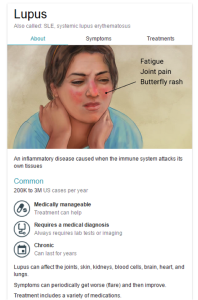Guest posting by Sanjana Puri
Just Google it. This all too common phrase of the 21st century has become an integral part of our daily lives. Dying to know who invented toaster strudel? Google it. Need to know if a rash is poison ivy? Google it. With sites like letmegooglethatforyou.com that mock those who don’t merely Google, it’s clear the search engine dominates the field. And now, it’s turned medical.
Google recently launched a knowledge graph (a knowledge base used to enhance its search results with semantic-search information gathered from a wide variety of sources) that would streamline the task of searching for health relevant information for common conditions.
“..when you ask Google about common health conditions, you’ll start getting relevant medical facts right up front from the Knowledge Graph. We’ll show you typical symptoms and treatments, as well as details on how common the condition is—whether it’s critical, if it’s contagious, what ages it affects, and more. For some conditions you’ll also see high-quality illustrations from licensed medical illustrators.”
To test it out, I googled a relatively common disease that wasn’t so familiar to me, “lupus”. In my search, I found a new feature, a nicely laid out diagram of basic and medically relevant information:
Watch out WebMD, Google just stepped up its health info. game. From symptoms to prevalence, Google has really out done itself in its layout of information from some of the world’s best doctors (Google, Mayo Clinic, etc.). Thinking back to my anatomy class last semester, this tool synthesizes all the basic information we learned about various diseases in a nice, neat package. The diagram even lists specific psychological symptoms and prescription drugs many would not even think to search.
Leveling the medical information playing field for patients just got one-click easier. In my first blog, I discussed the option for patients to access personal health records in between doctor visits. Now, we can quickly access personal health records and medically reliable information to be better informed patients.
There are caveats, of course, as with any internet search. While applying to college and searching for admissions information, I used a site called College Confidential, the web’s premier community for college-bound individuals. Here are some caveats I realized after using College Confidential, which greatly parallel some guidelines to using Google’s Knowledge Graph:
- Don’t take anything you read at face value: Google may seem all-knowing, but when it comes to your health, conditions vary, and it’s best to consult a physician.
- Do utilize other resources on the site: While Google has done an excellent job of consolidating reliable and relevant health information, it still provides numerous search results. Be sure to peruse other health-related sources for more holistic answers.
Nonetheless, Google has provided the world another great knowledge source. The digital age is an exciting time to be a patient, with numerous outlets of medical information available. Even for providers, who now have access to facts for a quick review.
Empower yourself with health knowledge.
Just Google it.

